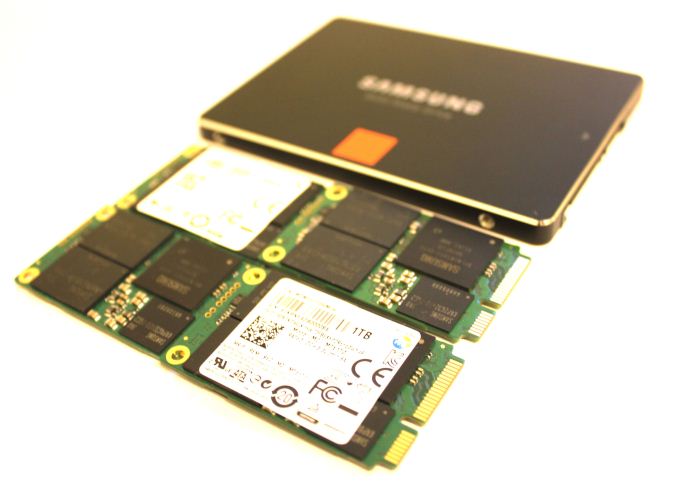Samsung SSD 840 EVO mSATA (120GB, 250GB, 500GB & 1TB) Review
by Kristian Vättö on January 9, 2014 1:35 PM ESTFinal Words
I would say the biggest market for mSATA drives right now is DIY upgrades to Ultrabooks and other laptops with existing mSATA SSDs (or in some cases there's an empty mSATA slot). One of the most common complaints I hear about Ultrabooks is their limited storage capacity because many got used to the thinking that even $400 laptops have 500GB of storage. Nowadays most SSD-only systems ship with a 128GB SSD, which to be honest is a significant downgrade if you've gotten used to having at least half a terabyte in your laptop. The rise of cloud services has reduced the need for internal storage (most smartphones and tablets only have 8-32GB) but there are still plenty of scenarios where cloud is out of question. Take photographers as an example -- if you shoot large RAW photos, uploading/downloading them constantly doesn't sound like the best idea especially if you happen to live in a region where unlimited Internet is only a dream.
In the past if you wanted a bigger mSATA SSD, your options maxed out at 256GB (Mushkin's Atlas was the only exception, though you had to sacrifice performance for capacity). For hybrid systems (i.e. PCs with a small SSD for caching and a hard drive for storage) 256GB can cut it since the storage needs are fulfilled by the hard drive but if you have an SSD-only system 256GB may not be much of an upgrade over the 128GB that most systems ship with.
Four EVO mSATA take roughly the same space as one 2.5" drive
That is where the EVO mSATA excels in. With capacity of up to 1TB and an impressive performance result, it is truly a no-compromise mSATA SSD. mSATA is no longer a tradeoff between capacity and size, the EVO mSATA provides everything that the 2.5" EVO does but at ~1/4 the footprint. Add that to the fact that the EVO mSATA is built on the same platform as the 2.5" EVO, which has been one of our highest recommendations since its release. What Anand said in his 840 EVO review's final words suits here perfectly as well: "To say that I really like the EVO is an understatement".
Samsung continually amazes me in the SSD space. The EVO mSATA is yet another proof that their engineering is state-of-the-art and almost one step ahead of others. I cannot wait to see what else Samsung has in their sleeves for 2014, and we will analyze with a critical eye as always, but the start is great for sure.












65 Comments
View All Comments
spejr - Tuesday, January 14, 2014 - link
Why do people still use mSATA? It might not make a difference for IOPS, but when opening a program the higher sequential read of PCIe would be a benefit. The NAND could supposedly go faster than 540.Kristian Vättö - Wednesday, January 15, 2014 - link
Because the support for PCIe is very limited. There are only a handful of laptops that use PCIe SSDs (and some of the have a proprietary connector like the MacBook Air) and in the desktop world all PCIe SSDs are currently just two or more SATA SSDs in RAID (though that will change during the next few months).bbordwell - Wednesday, January 15, 2014 - link
Any chance we could get an in depth review of Samsung's RAPID now that it is available on both the EVO and the PRO? I am curious if it would have a larger impact for writes on the PRO than the EVO since the PRO does not have the SLC write cache.RShack - Friday, January 17, 2014 - link
What % of your responses are to posters who evidently haven't bothered to even read the dang article?swiftdimension - Friday, January 17, 2014 - link
Just curious, if you guys connect a mSATA drive by letting it dangle connected to power and a SATA cable since the Asrock z68 Pro 3 doesnt have a mSata slot?Kristian Vättö - Saturday, January 18, 2014 - link
We use an mSATA to SATA 6Gbps adapter.Qlaras - Friday, January 17, 2014 - link
So I was considering ordering one of Gigabyte's sole AMD Brix - GB-BXA8-5545, and a 180-240GB mSATA SSD. (Now that the Brix is FINALLY released)Torn between waiting for the Samsung 840 EVO mSATA and just paying the premium for an Intel 525 and getting it now.
The Samsung has newer features/tech, and the price will (probably) be lower - MSRP matches what the 525 is going for now though, and the 525 comes with a 5-year warranty, versus 3 on the EVOs.
Thoughts?
Kristian Vättö - Saturday, January 18, 2014 - link
Crucial M500 should be a good compromise -- it's available now and the pricing is competitive.Coup27 - Saturday, January 18, 2014 - link
Did that maximum bus speed vs latency graph really come from Micron? It's clearly been drawn in MS Paint. The Y axis isn't even vertical!Good article nevertheless.
Kristian Vättö - Sunday, January 19, 2014 - link
Yup, here's the presentation (slide 9): http://www.flashmemorysummit.com/English/Collatera...